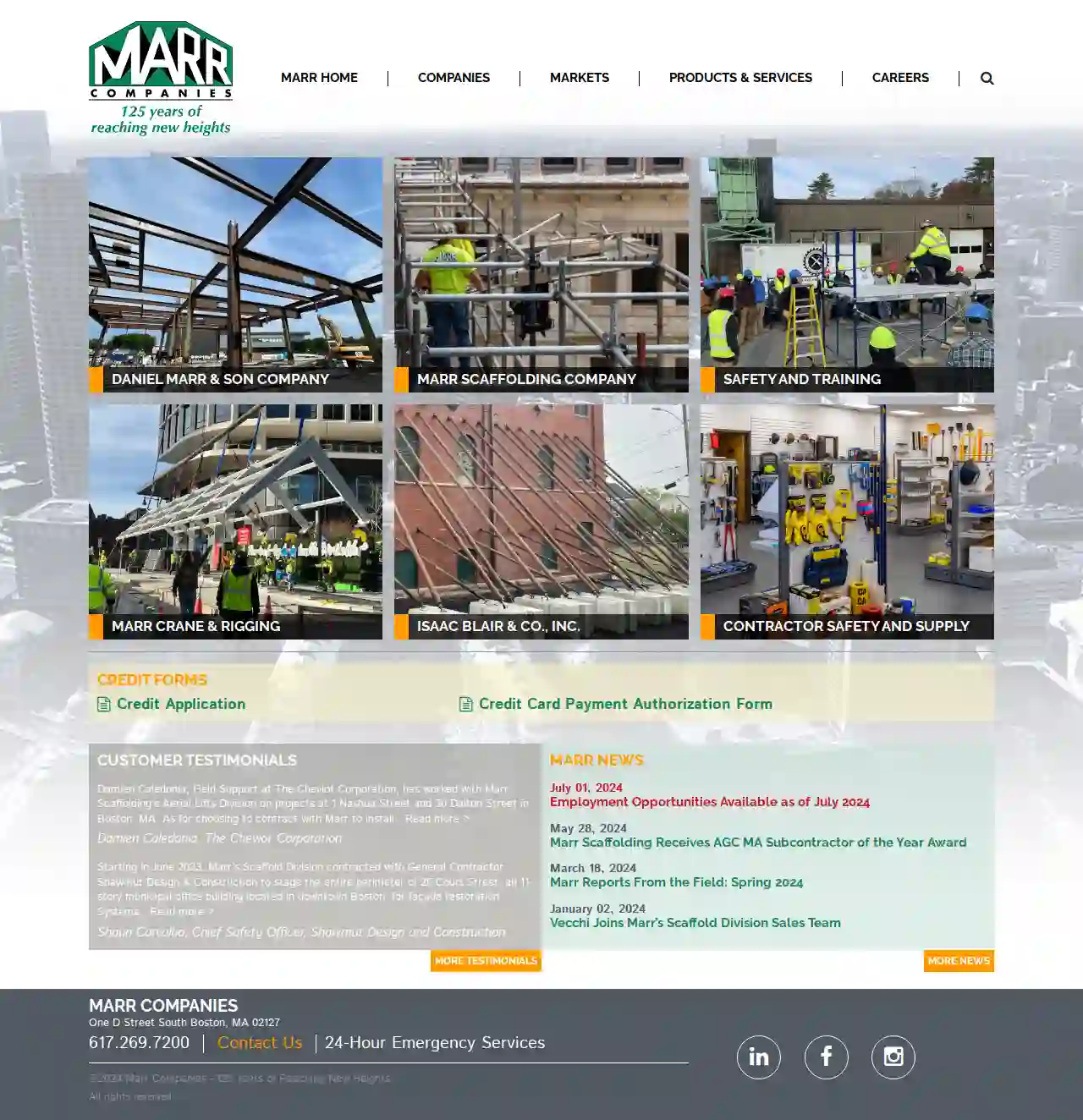Scaffolding Companies Valley Falls
Find Scaffolding Contractors in Valley Falls
Get multiple Scaffolding Companies quotes for your project today! Compare profiles, reviews, accreditations, portfolio, etc... and choose the best service.

Marr Scaffolding Company - Providence
44 reviewsOne D Street South Boston, MA, Boston, 02127, USMarr Companies: A Legacy of Excellence For over 125 years, Marr Companies has been a trusted leader in the construction industry, providing a wide range of services and products to meet the needs of our clients. Our commitment to safety, quality, and customer satisfaction has earned us a reputation for excellence throughout the region. Our Mission Our mission is to provide our clients with the highest quality construction services and products, delivered safely and efficiently. We strive to build lasting relationships with our clients, based on trust, respect, and a shared commitment to excellence. Our Values Our values guide everything we do. We are committed to: Safety First Quality Workmanship Customer Satisfaction Integrity and Ethics Teamwork and Collaboration Our Experience Our team of experienced professionals has a deep understanding of the construction industry and a proven track record of success. We are committed to providing our clients with the best possible service and support, from the initial planning stages to the final completion of the project.
- Services
- Why Us?
- Gallery
Get Quote
Atlas Scaffolding & Equipment
51 reviewsWarwick, RI, 80 Gilbane Street, 02886, USAtlas Scaffolding & Equipment is a full-service scaffolding, shoring, and trash chute equipment rentals, sales, installation, and dismantling services company. Established in 1997, they cater to contractors, municipalities, and industrial customers throughout Rhode Island, Southeastern Massachusetts, and parts of Connecticut. Their main facility is located at 80 Gilbane Street, Warwick, RI. Known for their excellent safety record, quick and responsive service, free estimates, full insurance, strict OSHA compliance, and membership in the SIA, Atlas Scaffolding is a trusted name in the industry.
- Services
- Why Us?
- Accreditations
- Our Team
- Testimonials
- Gallery
Get Quote- Ne
Newport Builders' Supply Co
Providence, US- Services
- Why Us?
Get Quote
Over 2,353+ Scaffolding Contractors registered
Our scaffolding contractors operate in Valley Falls & surrounding areas!
ScaffoldingHQ has curated and vetted the Best Scaffolding Businesses arround Valley Falls. Find a reliable pro today.
Frequently Asked Questions About Scaffolding Companies
- Traditional and highly versatile.
- Components (tubes, clamps, boards) are assembled on-site.
- Adaptable to complex shapes and structures.
- Requires skilled labor and more time for erection.
- Pre-engineered, modular components.
- Faster and easier to erect.
- Often has higher load capacities.
- May be less versatile for complex shapes.
- Mobile Elevated Work Platforms (MEWPs): Scissor lifts, boom lifts, and other MEWPs offer flexible access for specific tasks.
- Mast Climbing Work Platforms (MCWPs): Ideal for high-rise construction, providing a stable working platform that can be raised incrementally.
- Suspended Access Equipment: Ropes and harnesses used for specific tasks like window cleaning or façade repairs.
- Ladders and Step Ladders: For shorter durations and limited working heights, provided they are used safely and appropriately.
- Work at Height Regulations 2005: Covers all work at height and outlines the need for risk assessments, competent erectors, and safe equipment.
- Construction (Design and Management) Regulations 2015 (CDM): Applies to construction projects and requires planning for scaffolding safety throughout the project lifecycle.
- British Standard BS EN 12811: Sets standards for the design, manufacture, and testing of scaffolding components.
- NASC (National Access & Scaffolding Confederation) Guidance: Provides industry best practices and safety recommendations for scaffolding.
What is the difference between tube and clamp scaffolding and system scaffolding?
Tube and Clamp Scaffolding:
What are some alternatives to traditional scaffolding?
Can I erect scaffolding myself?
What are the safety regulations for scaffolding in the USA?
What is the difference between tube and clamp scaffolding and system scaffolding?
Tube and Clamp Scaffolding:
- Traditional and highly versatile.
- Components (tubes, clamps, boards) are assembled on-site.
- Adaptable to complex shapes and structures.
- Requires skilled labor and more time for erection.
- Pre-engineered, modular components.
- Faster and easier to erect.
- Often has higher load capacities.
- May be less versatile for complex shapes.
What are some alternatives to traditional scaffolding?
- Mobile Elevated Work Platforms (MEWPs): Scissor lifts, boom lifts, and other MEWPs offer flexible access for specific tasks.
- Mast Climbing Work Platforms (MCWPs): Ideal for high-rise construction, providing a stable working platform that can be raised incrementally.
- Suspended Access Equipment: Ropes and harnesses used for specific tasks like window cleaning or façade repairs.
- Ladders and Step Ladders: For shorter durations and limited working heights, provided they are used safely and appropriately.
Can I erect scaffolding myself?
What are the safety regulations for scaffolding in the USA?
- Work at Height Regulations 2005: Covers all work at height and outlines the need for risk assessments, competent erectors, and safe equipment.
- Construction (Design and Management) Regulations 2015 (CDM): Applies to construction projects and requires planning for scaffolding safety throughout the project lifecycle.
- British Standard BS EN 12811: Sets standards for the design, manufacture, and testing of scaffolding components.
- NASC (National Access & Scaffolding Confederation) Guidance: Provides industry best practices and safety recommendations for scaffolding.